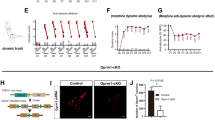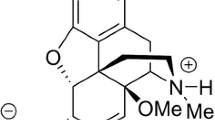Abstract
Rationale: By acting on peripheral opioid receptors, opioid agonists can attenuate nociceptive responses induced by a variety of agents. Objectives: This study was conducted to characterize capsaicin-induced thermal hyperalgesia in rats and to evaluate the hypothesis that local administration of either mu or kappa opioid agonists (fentanyl and U50,488, respectively) can attenuate capsaicin-induced nociception. Methods: Capsaicin was administered s.c. in the tail of rats to evoke a nociceptive response, which was measured by the warm-water tail-withdrawal procedure. Either fentanyl or U50,488 was co-administered with capsaicin in the tail to evaluate local antinociceptive effects. In addition, the local antagonism study was performed to confirm the site of action of both opioid agonists. Results: Capsaicin (0.3–10 µg) dose dependently produced thermal hyperalgesia manifested as reduced tail-withdrawal latencies in 45°C water. Co-administration of either fentanyl (0.32–3.2 µg) or U50,488 (10–100 µg) with capsaicin (3 µg) attenuated capsaicin-induced hyperalgesia in a dose-dependent manner. Furthermore, this local antinociception was antagonized by small doses (10–100 µg) of an opioid antagonist, quadazocine, applied s.c. in the tail. However, the locally effective doses of quadazocine, when applied s.c. in the back (i.e., around the scapular region), did not antagonize either fentanyl or U50,488. Conclusions: In this experimental pain model, activation of peripheral mu or kappa opioid receptors can attenuate capsaicin-induced thermal hyperalgesia in rats. It supports the notion that peripheral antinociception can be achieved by local administration of analgesics into the injured tissue without producing central side effects.
Similar content being viewed by others
Author information
Authors and Affiliations
Additional information
Received: 10 May 1999 / Final version: 18 August 1999
Rights and permissions
About this article
Cite this article
Ko, M., Tuchman, J., Johnson, M. et al. Local administration of mu or kappa opioid agonists attenuates capsaicin-induced thermal hyperalgesia via peripheral opioid receptors in rats. Psychopharmacology 148, 180–185 (2000). https://doi.org/10.1007/s002130050040
Issue Date:
DOI: https://doi.org/10.1007/s002130050040




